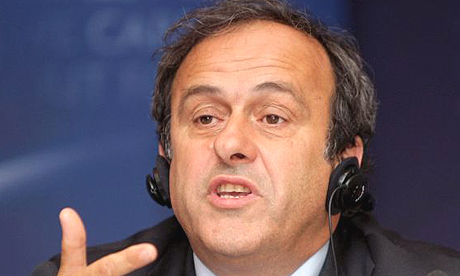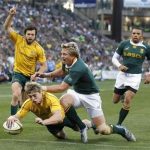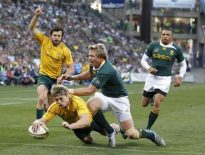By Mike Collett
WARSAW (Reuters) – UEFA president Michel Platini has warned players they would be booked if they walked off the pitch for being racially abused at Euro 2012 and they should instead talk to the referee who can decide whether to stop the game.

Platini, in his opening news conference two days before the start of the tournament on Friday, said referees were fully empowered to halt matches temporarily, or abandon them totally, if racist abuse was directed at players from the crowd.
Italy forward Mario Balotelli said last week that he would walk off the field if he was targeted, but Platini warned him, and every other player, not to do anything rash.
“We will certainly support the referee if he decided to stop the game. But it’s not a player, Mr Balotelli, who’s in charge of refereeing. It’s the referee who takes these decisions.
“So, the referee has been given advice and he can stop the game if there are problems.
“But it’s not me, not the UEFA president, who is in charge of the game for 90 minutes. It’s the referee. We will support the referee, of course – always.”
Pierluigi Collina, the former World Cup final referee who is now UEFA’s chief refereeing officer, told reporters at the briefing that UEFA officials had visited all 16 teams and explained the procedure to stop the game.
NECESSARY ACTION
He said that if a player complained to the referee about racism, the referee would take the necessary action.
“The referees have a protocol so they know what they have to do. The match director knows what has to be done. The players know the protocol.
“We have visited all the camps before the start of the competition, so everything is clear and everyone is ready.”
Piara Power, executive director of Football Against Racism in Europe (FARE), who was also at the briefing, told reporters afterwards: “There is no question we are more worried about racism at this tournament than at any other and it is good to know that Mr Platini understands what is going on.
“We have 31 independent international monitors and it is their job, not just to look out for the more obvious racism, but also the nuanced issues, that is certainly not the job of the referee.
“Their job is to pick out right-wing banners and insignia, and discriminatory chants and to provide ongoing liaison with the match delegates.
“We are expecting that UEFA’s disciplinary commission will sanction any fans displaying far-right banners as there have been at past Euros. The UEFA system is three strikes and you are out.
“A fine, then another fine, then forcing teams to play behind closed doors. If the system is in full effect we could have a team kicked out of the competition for far right banners.”
REAL WORRY
Powar also said the fact more locals may take up tickets not being used by travelling fans from abroad is also a worry.
“It is a fear on our side. There are tickets on the open market which locals are buying and that is a danger, there is no making allowance for that.”
Croatia, who play in the same group as Ireland, Spain and Italy, have twice been fined for the racist behaviour of their fans, but the three-strike rule does not apply to them as one sanction was from FIFA and another from UEFA.
The European governing body fined them 20,000 Swiss francs a few weeks after Euro 2008 for racist banners and behaviour during their match against Turkey.
World ruling body FIFA then fined the Croatian FA 30,000 Swiss francs a few months later after their fans abused England’s Emile Heskey in a World Cup qualifier in Zagreb.
Platini said he had not seen the BBC Panorama programme shown last week that highlighted the racist behaviour of Polish and Ukrainian fans and was not aware that the families of England youngsters Theo Walcott and Alex Oxlade-Chamberlain had decided not to travel to the Euros for fear of racist attacks.
“I cannot comment on that,” he said, “and I can’t predict what’s going to happen, the behaviour of 60,000-70,000 people in a football stadium.
“But racism is a global problem and I don’t think there’s any more racism in Poland and Ukraine than in France or anywhere else, or even in England.
“It’s not a footballing problem. It’s a problem for society but we will try our best to regulate the problem in our football.”





